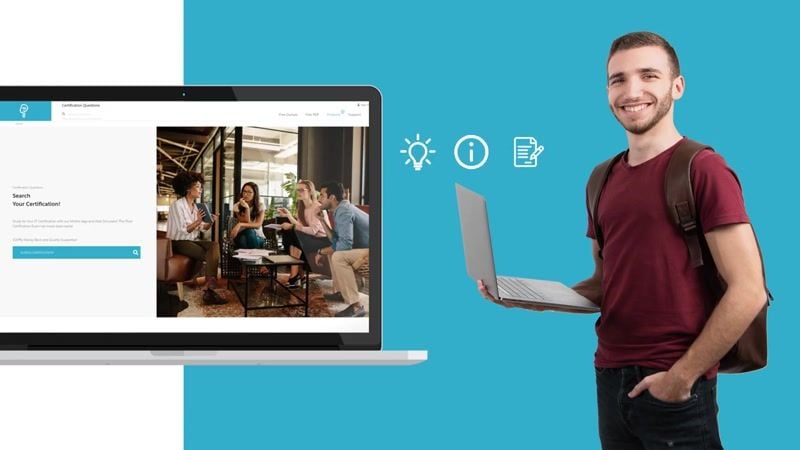Reading Time: 9 mins | Publish Date: 17 Feb 2026 | Update Date: 17 Feb 2026
How to Prepare For Oracle E-Business Suite R12.1 General Ledger Essentials 1z0-516
Preparation Guide for Oracle E-Business Suite R12.1 General Ledger Essentials 1z0-516
Introduction
The Oracle E-Business Suite 12 Financial Management Certified Implementation Specialist: Oracle General Ledger certification will help you build a functional foundation in E-Business Essentials. Certify your ability to access and navigate the R12 E-Business Suite, enter data, retrieve information in the form of a query and access online help to give yourself an edge against other candidates in the job market.
You will also develop a deeper understanding of Oracle General Ledger. Building these skills will allow you to perform simultaneous accounting for multiple reporting requirements and access and process data for multiple ledgers and legal entities at the same time. This is done using the power of ledger sets. OPN Members earning this certification will be recognized as OPN Certified Specialists, which helps their companies qualify for the Oracle E-Business Suite Financial Management Specialization.
This certification is for:
- Implementers
- Administrators
- Business Users
Understanding functional and technical aspects of Oracle Planning 2020 Implementation Essentials 1z0-516 E-Business Essentials
The following will be discussed here:
- E-business Essentials
- Navigating in R12 Oracle Applications
- Log in to Oracle Applications
- Navigate from Personal Home Page to Applications
- Choose a responsibility
- Create Favorites and set Preferences
- Use Forms and Menus
- Enter data using Forms
- Search for data using Forms
- Access online Help
- Run and monitor Reports and Programs
- Log out of Oracle Applications
- Shared Entities and Integration
- Explain shared entities within R12 E-Business Suite
- Describe key integration points and business flows between products in E-Business Suite (EBS)
- Identify Key Business Flows and products involved in E-Business Suite (EBS)
Understanding functional and technical aspects of Oracle Planning 2020 Implementation Essentials 1z0-516 Fundamentals of Multi-Org
The following will be discussed here:
- Fundamentals of Multi-Org
- Define Multiple Organization (Multi-Org)
- Describe the types of organizations supported in the Multi-Org model
- Explain the entities of Multi-Org
- Explain how Multi-Org secures data
- Identify key implementation considerations for Multi-Org
- Define Multi-Org Access Control
- Explain Multi-Org preferences
- Explain Enhanced Multiple-Organization Reporting
- Explain the concepts of subledger accounting
Understanding functional and technical aspects of Oracle Planning 2020 Implementation Essentials 1z0-516 Oracle General Ledger Process
The following will be discussed here:
- Oracle General Ledger Process
- Identify the steps required to complete the accounting cycle using Oracle General Ledger
- Describe how Oracle General Ledger integrates with other Oracle eBusiness applications
- Describe the integration of Oracle General Ledger with Oracle Subledgers & non-Oracle systems
- Explain implementation considerations for setting up and using Oracle General Ledger and Oracle eBusiness Suite
- Describe an overview of Accounting Setup Manager, currency concepts, budgeting, EPB, reporting & analysis
- Advanced Security
- Manage Data Access Security for Legal Entities and Ledgers
- Explain key Advanced Security setups and process
- Manage Data Access Sets
- Control security of Management Reporting
Understanding functional and technical aspects of Oracle Planning 2020 Implementation Essentials 1z0-516 Financial Reporting
The following will be discussed here:
- Financial Reporting
- Explain the positioning of Financial Reporting within the Oracle General Ledger business flow
- Build basic reports
- Use key elements of the Financial Statement Generator (FSG) for creating financial reports
- Use Standard listing reports available for FSG report definitions
- Create FSG Reports with XML Publisher
- Use Web ADI for Financial Reporting
- Explain key implementation issues regarding Oracle General Ledger financial reporting
Understanding functional and technical aspects of Oracle Planning 2020 Implementation Essentials 1z0-516 Accounting Setups
The following will be discussed here:
- Accounting Setups
- Create Accounting Setups
- Describe the various Subledger Accounting Options
- Perform the Primary Ledger Setup steps
- Describe Ledger Balancing Segment Value Assignments
- Perform the Secondary Ledger Setup steps
- Complete Accounting Setup
- Consolidations
- Explain overview of Consolidations and their positioning within the Oracle General Ledger business flow
- Identify the key implementation issues regarding consolidations
- Use the features and functionality of Global Consolidation System (GCS)
- Use the elements of the Consolidation Workbench
- Create eliminating entries
- Use Standard reports and inquiry options available for consolidations Ledger
- Describe the elements required to create a ledger within Oracle General Ledger
- Describe the basic components of Accounting Setup
- Describe the important elements for creating a Chart of Accounts structure
- Creating a new Accounting Flexfield structure
- Utilize the Account Hierarchy Manager to view and maintain Accounting Flexfield values
Understanding functional and technical aspects of Oracle Planning 2020 Implementation Essentials 1z0-516 Financial Budgeting
The following will be discussed here:
- Financial Budgeting
- Explain the anatomy of a budget
- Explain the components of budget accounting cycle
- Define budget and budget organization
- Explain Budget Entry methods
- Apply Budget Rules
- Transfer budget amounts
- Perform budget review and correction
- Translate budget balances
- Review balances in Master/Detail budgets
- Create budgets with Budget Wizards
- Use available Standard budget reports
- Plan Budget implementation requirements
Understanding functional and technical aspects of Oracle Planning 2020 Implementation Essentials 1z0-516 Introduction to Oracle Applications R12
The following will be discussed here:
- Introduction to Oracle Applications R12
- Explain the footprint of R12 E-Business Suite
- Describe the benefits of R12 E-Business Suite
- Describe R12 E-Business Suite architecture
- Fundamentals of Flexfields
- Describe Flexfields and their components
- Identify the steps to implement a Flexfield
- Define value sets and values
- Define Key Flexfields
- Define Descriptive Flexfields
- Fundamentals of Workflow and Alerts
- Explain Workflow concepts
- Describe the benefits of Workflow
- Basic Journal Entries
- Describe how journal entries are positioned in the accounting cycle
- Describe the different Journal Posting options
- Define how to perform Account Inquiries & Drilldown to Oracle Subledger Applications
- Import journal entry information using the GL_INTERFACE table
- Plan the key elements of Web Applications Desktop Integrator (Web ADI)
- Define Web ADI setup options for key flexfields
- Utilize Web ADI profile options, forms functions, menus, and responsibilities
Understanding functional and technical aspects of Oracle Planning 2020 Implementation Essentials 1z0-516 Multi-Currency
The following will be discussed here:
- Multi-Currency
- Explain Multi-Currency concepts
- Use Currency Rate Manager
- Perform Foreign currency journals Entry
- Perform Revaluation of foreign currency balances
- Translate functional balances into foreign currency
- Describe overview of Secondary Tracking Segment
- Use Foreign Currency Reports
Understanding functional and technical aspects of Oracle Planning 2020 Implementation Essentials 1z0-516 Accounting Setup Manager
The following will be discussed here:
- Accounting Setup Manager
- Describe the components of Ledger Processing options
- Describe Secondary Ledgers & Reporting Currencies
- Describe Accounting Setup considerations with one legal entity
- Describe Accounting Setup considerations with multiple legal entities
- Describe Accounting Setup considerations with no legal entities
- Advanced Journal Entries
- Create Recurring Journals
- Formulate Mass Allocation Journals
- Describe AutoAllocations and related implementation considerations
Understanding functional and technical aspects of Oracle Planning 2020 Implementation Essentials 1z0-516 AutoScheduling
The following will be discussed here:
- Explain AutoScheduling
- Describe the Journal Scheduling process
- Describe key issues and considerations when implementing Advanced Journal Entry
- Describe the business benefits of using Oracle General Ledger’s Advanced Journal Entry functions
- Summary Accounts
- Explain summary accounts and how they are used in General Ledger
- Define How Parent Values/ Rollup Groups are used in General Ledger
- Determine how Summary Templates are used
- Use Budgetary Control & maintain Summary accounts
- Plan and maintain Summary Account structures
- Period Close
- Explain the accounting cycle
- Perform key steps in the close process
- Perform journal import of subledger balances
- Perform Subledger Reconciliation
- Explain the Period Closing Process and Reports
- Consolidate account balances
Certification Path
Oracle E-Business Suite R12.1 General Ledger Essentials 1z0-516 is a fundamental exam. Successful completion by candidates will allow them to achieve Oracle E-Business Suite 12 Financial Management Certified Implementation Specialist: Oracle General Ledger status.
Who should take the Oracle Planning 2020 Implementation Essentials 1z0-516
This certification is for:
- Implementers
- Administrators
- Business Users
The Oracle E-Business Suite 12 Financial Management Certified Implementation Specialist: Oracle General Ledger certification will help you build a functional foundation in E-Business Essentials. Certify your ability to access and navigate the R12 E-Business Suite, enter data, retrieve information in the form of a query and access online help to give yourself an edge against other candidates in the job market.
You will also develop a deeper understanding of Oracle General Ledger. Building these skills will allow you to perform simultaneous accounting for multiple reporting requirements and access and process data for multiple ledgers and legal entities at the same time. This is done using the power of ledger sets. OPN Members earning this certification will be recognized as OPN Certified Specialists, which helps their companies qualify for the Oracle E-Business Suite Financial Management Specialization.
The Planning Cloud 2020 Certified Implementation Specialist has demonstrated the knowledge and expertise in implementing Enterprise Performance Management and Planning solutions. Individuals with this certification can set up and configure security, set up a Planning business process, and configure the Financials, Workforce, Capital, and Projects modules, and design Reports and Documents.
This certification is available to all candidates.
It’s geared toward members of the Oracle Partner Network who are focused on selling and implementing Financial Management modules. The exam targets the intermediate-level implementation team member. Up-to-date training and field experience are recommended.
How much Oracle E-Business Suite R12.1 General Ledger Essentials 1z0-516 costs
- Examination Name: Oracle E-Business Suite R12.1 General Ledger Essentials 1z0-516
- Passing Score: 60% or higher
- Length of Exam: 150 min
- Types of questions: Performance Based Questions
- No. of Questions: 80 Questions
- Examination Fees: $250 USD
How to book the Oracle Planning 2020 Implementation Essentials 1z0-516
You can schedule the exam anytime at Pearson VUE. You can pay directly from a credit card or redeem a voucher purchased from Oracle.
Average Salary of Oracle E-Business Suite R12.1 General Ledger Essentials 1z0-516Certified Professionals
The average salary:
- United State - 151,682 USD
- India - 6,71,117 INR
- Europe - 100,440 EURO
- England - 75,267 POUND
What is Implementation Essentials 1z0-516 Certification Exam and Retake policy
Oracle Cloud Certification credentials are valid for a period of 18 months from the date you earn the credential. The credential will become inactive at the end of 18 months. Oracle requires candidates to hold an active credential in order to access certain certification benefits including, without limitation, use of Oracle certification logos, e-Certificates, score reports, digital badges and certification verification.
All the candidates must wait 14 days before retaking a failed proctored exam. (Registration will be allowed on the 14th day). Candidates may not retake a passed exam at any time and may not retake a beta exam at any time. Also, candidates are only allowed 4 attempts to pass an exam in a 12-month period.
Get a sound understanding of Oracle E-Business Suite, including navigation, key business flows, functionality, and integration points between products. Smoothly implement and start using the applications, so that your organization can quickly realize the full value of Oracle E-Business Suite.
Difficulty in Attempting Oracle E-Business Suite R12.1 General Ledger Essentials 1z0-516
If the user has successfully passed the 1z0-516 practice exam and has been through 1z0-516 dumps then the certification exam will not be too much difficult as the user has shown aptitude for understanding complicated processes.

